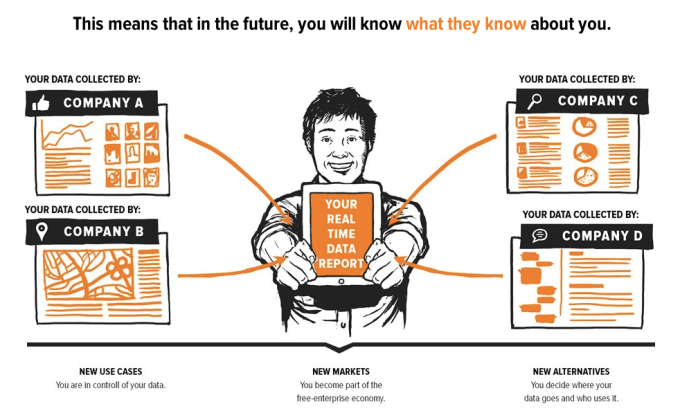German startup Protonet, which last year raised just over $4 million via Seedmatch for its secure server product for SMEs — 8x more crowdfunding than it had originally sought — has cooked up a new initiative using some of that funding, and this time it’s a not-for-profit campaign lobbying for a change in European law to open up individual access to personal data held by digital platforms and service providers.
The online ‘Free Your Data‘ campaign, which is being announced today and will kick off properly next week with the first full video ‘episode’ in what’s intended as a multi-part story to dramatize/garner attention for the campaign’s message, started out as a marketing idea for Protonet, to make the abstract notion of ‘personal data’ more tangible — but quickly outgrew its marketing brief, according to co-founder Ali Jelveh, as the concept of lobbying for a new law led it to discussions with politicians and data activists and the campaign to gain wider support.
Backers of Free Your Data now include several German politicians and online activists (including MPs Konstantin von Notz, Lars Klingbeil and Jimmy Schulz). Various third party businesses have also extended support by providing services at below their normal business rate. Protonet is funding the first phase of the campaign but Jelveh says the group will have additional investors (as yet undisclosed), and he’s now in the process of spinning it out as a separate not-for-profit organization with the single aim of lobbying for a new data access law — which it’s calling the European Data Sovereignty Act.
What would this law entail exactly? The campaign is basically calling for an API for users to have real-time access to their personal data — once a company has more than 1 million recurring users — which would mean updating existing laws that provide individuals with a legal route to extract personal data from companies. Albeit one that typically takes a lot of time and effort, and likely results in a paper-based data dump of dubious value. What if, instead of that tedious and/or tortuous process, web users could gain real-time access to their personal data in a machine readable format as a matter of course? That’s the change the Free Your Data campaign wants to see.
Jelveh is quick to talk up the business innovation that such real-time access could unlock, as one motivating force for the campaign — imagining how startups could be born to help web users aggregate, compare and understand their use of different services, via these personal data APIs. (Of course you could also say there’s an element of business envy here too; of smaller European commercial entities seeking a route through the walled gardens of dominant (and often U.S.-based) web platforms to monetize usage.)
“We had this idea, how cool would it be if you would know what the big companies know about you? Not that they would have to shut down their tracking systems and things like that, the only difference would be that you would also know what you know about you,” he tells TechCrunch.

“We believe that opening up the floodgates to your data to really be available to you to sell it, or to optimize it, or to have a data agent or a data lawyer, or whatever you’d call it, would open up huge new possibilities. All these data streams would end up with you. And that means that a whole range of possibilities are available to you in terms of what you want to do with that. But for that to happen, you have to have access. And it has to practical access.”
“If we continue with the notion that data is some magical thing and so abstract and hard to understand we are going to end up in a huge mess. This transparency [means] you start to learn, with every interaction in the world, and you have instant data feedback, you’ll have a whole different range of options and much more profound choice that you can take,” Jelveh adds.
“If we could get people engaged with it and playing around with it, and making things transparent and having them see — really see their digital footprint — then we could have a different kind of discussion about it.”
Beyond that, the wider philosophical mission here boils down to pushing transparency as an alternative to the current (European) legislative thrust towards increasing individual privacy protections — given that such regulations could be seen as a hinderance to digital businesses. What if, Jelveh posits, legislation were mandating opening up access to personal data held by commercial entities instead of increasing privacy protections — so that users could make properly informed decisions about the services they choose to use?
“While current legislation is more about what should be in that data or what should not be in that data, and how much privacy is the right amount of privacy and things like that… this is really about access,” he says. “The tracking companies would continue to track, or your telecom providers would continue to scan data, or to collect data about you, but by the transparency aspect you would know about it. And then you could take a choice on which telco provider you want to use. The one that’s collecting more information, or the one that’s collecting less information?”
It’s an interesting idea. But it remains to be seen whether the campaign — which will take the form of an online petition, social media activity and various other campaigning actions (including some events to be held in Germany) — gathers momentum or not. They’re hoping to channel concerns among web users about how vast amounts of personal data is controlled and monetized by corporate entities. But of course spend any time online and you’ll quickly hear the view propounded that people don’t give a stuff about what happens to the bits and bytes they generate so long as they can keep accessing the (free) service. Clearly Free Your Data reckons other views are available. 
There’s also a timely element here, from a European political perspective, with the EU currently in the midst of harmonizing and negotiating a new data protection directive. Which means MEPs have privacy and data on their mind (albeit this campaign is only tangentially related, given it is focused on transparency and data access, rather than on ways to secure privacy).
“The European Commission are actually working right now on these new EU privacy draft laws… We are talking to campaigners there, and to MPs in the European Parliament who want to push these aspects in,” adds Jelveh.
How confident is he of being able to exert enough pressure to get a proposed law onto the statute books (either in Germany or at the European Commission level) — or at least put the idea on the table for serious political discussion? He’s not quantifying that in so many words at this nascent stage, but suggests there is a chance to build momentum, given the transparency concept could garner broader political backing from those who hold anti-data privacy views, as an alternative to tightening the privacy screw.
“You can say we have basically two choices: either we invent something new, or we have more data privacy in Germany and in Europe…. So I think there is an opening there,” he says. “If you can engage enough people — and we have already engaged with the politicians — I think there is an opening that would allow for this law to pass within 12 months.
“Or at least to be put on the table within 12 months. That would be also a huge step. Having it being talked about in the German parliament, or the EU parliament would already be a huge step.”
Expect the first full video in the campaign to drop on Monday. And the finale to land in early May. Albeit the plan is to keep Free Your Data agitating for change until a draft law is put before parliament — so this campaign might run and run.
